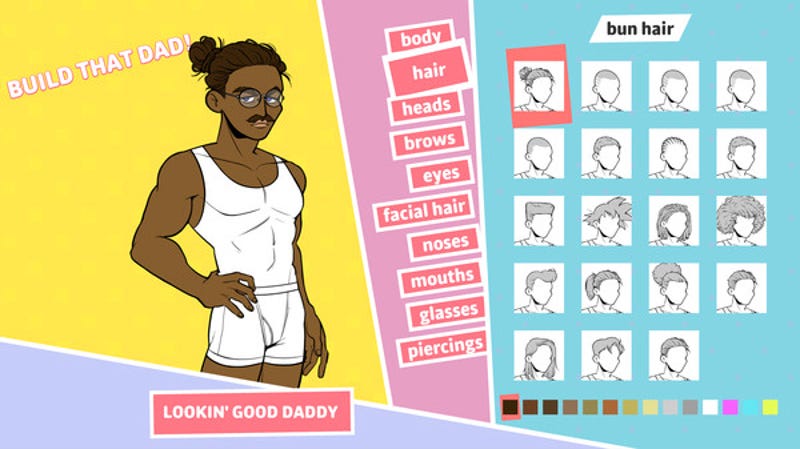Keep it Simple, Daddy

In a recent interview with Nathan Grayson from Kotaku, Vernon Shaw and Leighton Grey discussed the process of writing Dream Daddy and their attempts to make sure it didn’t treat homosexuality as a joke. A point brought up in the interview was that there has been criticism that the sexual and gender identities of the characters were not stated explicitly enough. And I totally agree. It’s not a new argument that representation is important, and having creators explicitly name that their characters are diverse is key to moving the industry forward.
But part of the interview that really resonated with me was when Leighton said: “we never wanted to make any of the dads’ stories revolve around their sexuality, because I think there’s already a lot of stories about that experience and there’s so many stories that are really angsty, or solely about coming out…ultimately we just wanted to normalize it and maybe kind of have it in this slightly fantastical situation where it’s just not really discussed and everyone’s on the same page”. The use of the word “normalize” is always tricky since it can imply a range of meanings, both positive and negative. Moving away from people’s identities always walks the line of erasure, and can be hard to navigate. But I really agree with the core of Leighton’s sentiment. So much queer media is about the process of coming out, or dealing with the fall out of coming to terms with our identities. Dream Daddy is one of the few games that I felt was about queerness without having to delve into the coming out narrative for the millionth time.
There’s no denying that this is an inherently queer game. No matter how you create your character, they’re bi, pan, gay, fluid, or some kind of identity that’s not straight and possibly not cis depending on how you build them out. The trend continues into the actual game as you have no choice but to be in a queer relationship. Through this utter refusal to allow non-queer identities into the game, I feel that Dream Daddy makes up for its lack of explicit identification.

While it is fantastical that people’s identities only come across in passing, it’s a fantasy I am very willing to indulge. Video games are about escapism and creating worlds we’ve never seen or been to before. The world of Dream Daddy isn’t a bad one when it comes down to it. Getting to see characters of different races, body types, and gendered experiences depicted in a positive light was really refreshing, even if they were presented in a somewhat simple fashion. Getting to experience the development of each Dad beyond their “dad trope” was fun, endearing, and surprising. I genuinely enjoyed getting to see the trials and achievements in each man’s life without the added weight of a coming out narrative (there is one kind of exception to this, but his narrative was still surprising and interesting in how it turns out).

Now, of course, there is a definite need to do deep dives into the experiences of marginalized people as our identities are a defining part of who we are and how we move through the world. Different voices and perspectives should always be given a platform to share, especially in a time when there’s so much working towards silencing those voices. But that work can be so difficult and draining, and it generally falls onto the shoulders of those who are most at risk. Every now and again, we need something fun and light to break up the challenges and downright horrors that face marginalized communities.
For me, Dream Daddy is absolutely a step in the right direction. Not only do we need more queer people, POC, disabled people, etc. in games, we need to see them as 1. more than set-pieces or foils for the emotional development of others, and 2. capable of living lives that are still complex, but ultimately filled with joy and fulfillment. I don’t want to keep seeing the same old “kid comes out and has to overcome the consequences” narrative, nor do I want to see queerness thrown in as an afterthought to make emotional moments seem deeper than they actually are (looking at you, Life is Strange). Instead, I want more of the challenges this game brings to light: discussions on the difficulty of self-care and realizing that you deserve good things, why we stay in relationships that clearly aren’t working, how we navigate boundaries as parents, etc.
I’ll admit, Dream Daddy doesn’t dive into these issues as deeply as I would’ve liked, but it was still a validating experience that I wouldn’t trade and would highly recommend to those seeking a bit of queer joy in their video games. It’s rough out there these days. We all deserve something to lighten the mood and remind us of the ways our lives can be real and wonderful in the wake of so many attempting to make us feel small, unwanted, or forgotten.





